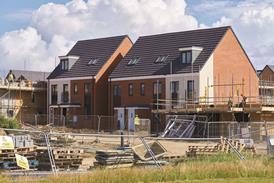We are no more than 12 months away from the next general election and it shows. Although party conference season is a fast-fading memory, housing and planning dominated all of them to various degrees – from the rebellion on the floor led by younger members at the Liberal Democrat conference, through to the fallout from the lack of focus by the leadership on the issue in Manchester, right through to opposition leader Sir Keir Starmer’s strong stance at the Labour conference by making the issue a core part of his pitch to the country.

The focus on the housing is only likely to intensify as polling day gets closer, given that the issue is ranked a key one among many swing voters. This fact is highlighted to the Labour Party through opinion polls and focused research, and for many within the Conservative Party, awareness grows of the pivotal nature of the housing crisis.
During this period of heightened political interest there has never a greater need for the sector to move to strike a new longer-term approach to housing in the UK. In recent times, three former prime ministers – John Major, Tony Blair and Gordon Brown – have called for a cross-party consensus on the role of devolved mayors, so politicians need to forge a consensus around a new national housebuilding effort.
Much like the debate has shifted following the energy supply crisis to energy costs and concerns over energy security, a serious, concerted and consensus-based approach is needed to deliver new homes and improve the quality of existing homes.
While not to go as far as suggesting a new company along the lines of Great British Nuclear or British Energy to build new homes, if the next government (whatever political composition that may be) is serious about tackling the huge shortfall of homes being delivered each year, then it is going to have to become more muscular in actually making it happen.
This will have to go beyond simply reviewing the planning system, although this is important given the challenges faced by the housebuilding sector. It must also look at land supply, legal challenge at both plan-making and application stage, design and construction methods and costs, as well as the huge skills shortage the wider construction faces, and will continue to face, considering all of the other infrastructure that needs to be built or renewed over the next decade.
Why this needs to be done goes far beyond the housing and property sector. It must be done not only to meet climate obligations through decarbonising the housing sector, but in stark terms to save the NHS and improve the long-term financial outlook for the UK.
This may sound like a bold statement, but when considering the health implications of poor housing as well as the increasing housing benefit bill and the costs of temporary accommodation, it is undeniable. Many of the challenges currently faced by the NHS are driven by an inability to recruit and retain new and experienced staff, especially within areas with high housing costs.
Beyond the NHS, there is also the need to improve economic performance and productivity, especially for Labour and the party’s stated aims around a decade of economic renewal. Affordable housing has a critical role to enable employers to attract and retain employees and for productivity to improve.
The key question is how to achieve all this. Dolphin Living supports a piece of academic research entitled ‘Design For All – A Place to Call Home’. The report calculates the longer-term cost of poor housing as being greater than the capital requirements to deliver the affordable housing needed.
Central to the report is a call for a transformative national housing plan and a broader longer-term economic vision for housebuilding in the UK. Within this, there is an enhanced role for local authorities to actively participate in housebuilding and land assembly, plus granting them additional flexibility over housing finance. Councils, combined authorities and mayors will need to become more ambitious and muscular in delivering the supply pipeline, and a return of greater capital subsidy for affordable housing is needed.
A failure to do so will result in the continuation of the inability to hit even modest housing targets, creating housing misery for many and ever-increasing housing subsidy costs, but will also condemn our NHS to a future cost burden and recruitment crisis beyond the scale of today’s challenge.
Olivia Harris is chief executive of Dolphin Living































No comments yet